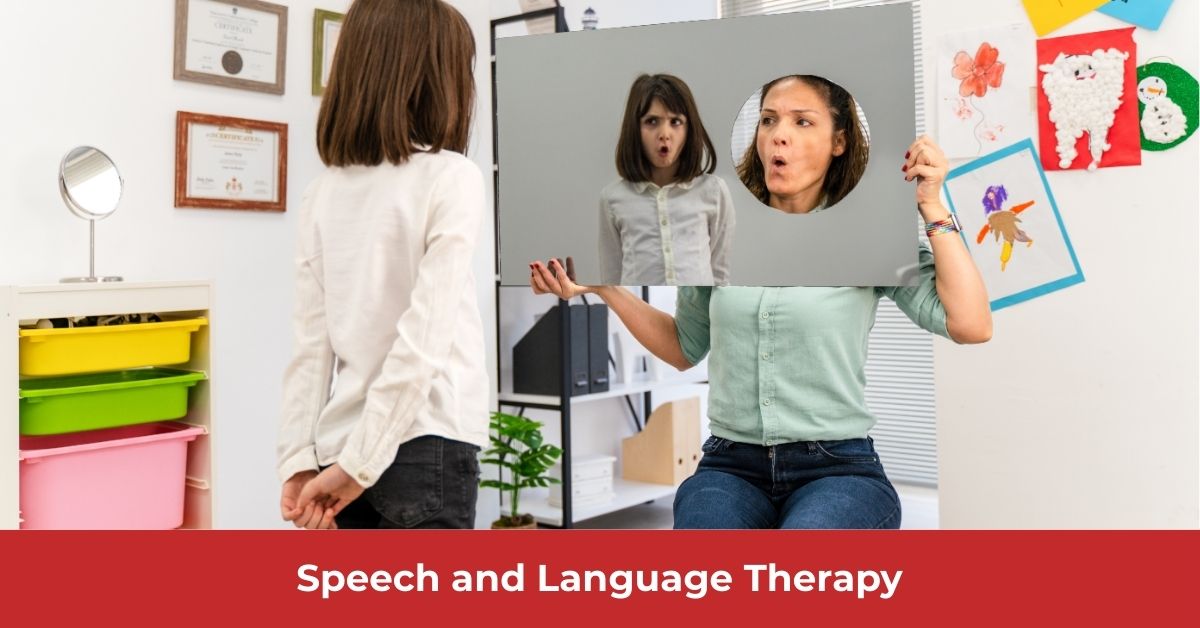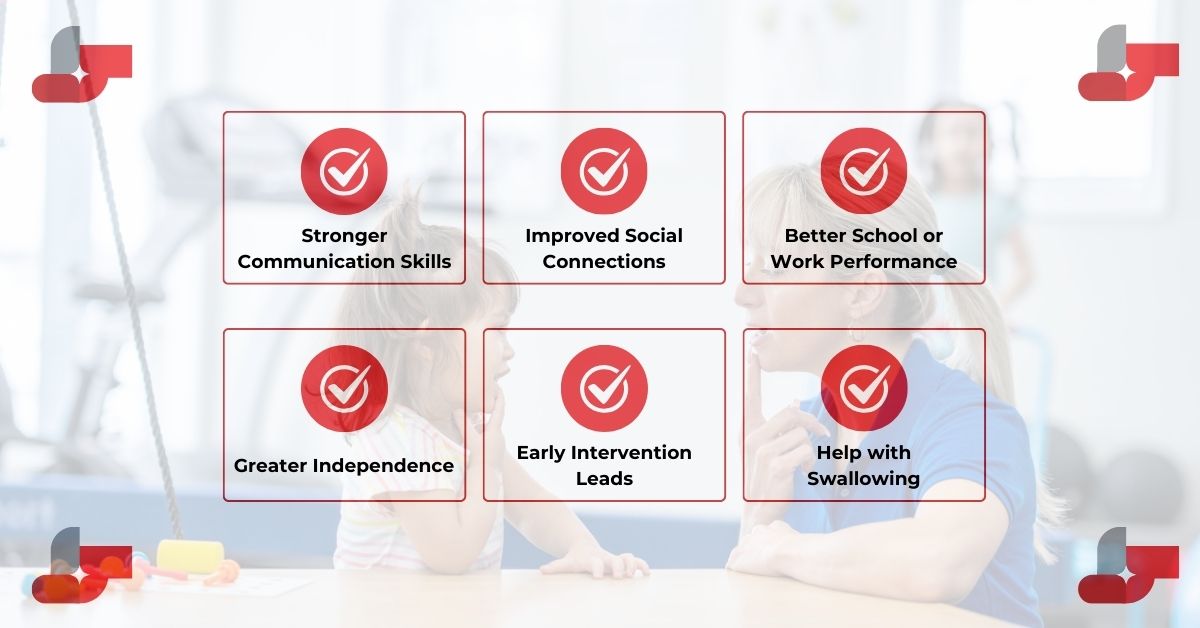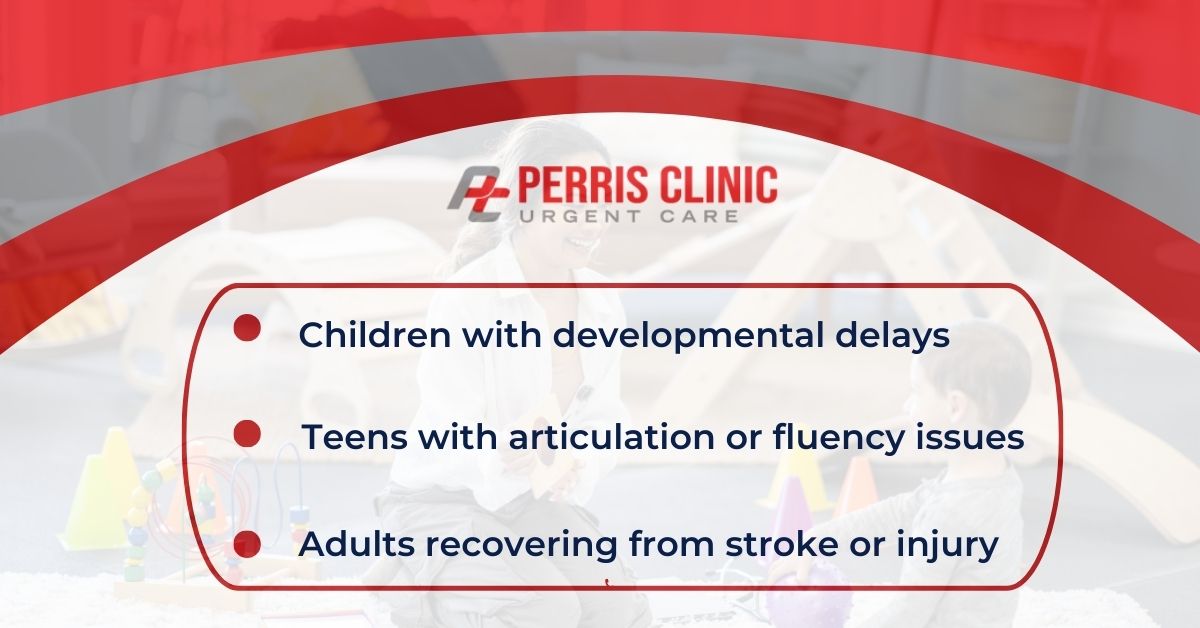Imagine being unable to express what you feel, need, or think. For many children and adults, this is their everyday experience. But there’s good news: speech and language therapy can make a world of difference.
At Perris Clinic, we believe that communication is more than just talking; it’s about understanding. It’s how we connect, build relationships, and navigate the world around us.
Whether it’s helping a child say their first words or supporting an adult after a stroke, speech therapy offers tools for meaningful change.
In this blog, we’ll walk you through what speech and language therapy is, who it helps, and the many benefits it brings to people of all ages.
Before diving into this post, check out our previous blog on Reasons for Occupational Therapy Referral for Adults, offering valuable insights into how OT supports adults with physical, emotional, and cognitive challenges in daily life.
What Is Speech and Language Therapy?

Speech and language therapy is a specialized service that helps people who have difficulty with communication or swallowing. It’s provided by licensed professionals called Speech-Language Pathologists (SLPs).
These therapists work with both children and adults on challenges such as:
- Speech delays
- Stuttering
- Difficulty understanding or using language
- Swallowing issues
- Cognitive-communication problems after injury or illness
The goal? To help people communicate confidently and comfortably in everyday life.
Who Can Benefit from Speech Therapy?
Speech and language therapy is not just for kids with speech delays. People of all ages can benefit, including:
- Toddlers and children who struggle with speech or language development
- Teens who have trouble with social communication or academic language
- Adults recovering from strokes, brain injuries, or living with conditions like Parkinson’s
- Seniors dealing with cognitive decline or swallowing issues
Whether it’s a child learning to say “mommy” or an adult relearning how to speak after an accident, speech therapy can provide real, life-changing support.
Curious about the length of a typical occupational therapy session? Find detailed insights on what to expect during your therapy at Perris Clinic here.
Powerful Benefits of Speech and Language Therapy
Communication is a basic human need. When it’s impaired, it can lead to frustration, isolation, or a lack of independence. But with the right support, people can build the skills and confidence they need to thrive in school, work, relationships, and everyday life.
Let’s break down the benefits of speech and language therapy.

Stronger Communication Skills
The most obvious benefit is better communication. Children learn to form sounds correctly and speak more clearly. Adults relearn skills they may have lost due to illness or injury.
Being able to say what you mean or ask for what you need is empowering. It builds self-esteem and reduces frustration for both the person and their loved ones.
Improved Social Connections
When someone struggles to speak, they may shy away from conversations or group settings. Over time, this can lead to loneliness and isolation.
Speech therapy helps boost confidence in social situations, like talking with friends, participating in class, or giving presentations at work. Strong communication skills also support healthy relationships.
Better School or Work Performance
For kids, speech and language are the foundation of reading, writing, and learning. A speech delay can make it hard to keep up in class, follow directions, or understand lessons.
- Speech therapy can help with:
- Vocabulary building
- Sentence structure
- Phonemic awareness (key to reading)
Adults may need help with voice control, pronunciation, or workplace communication. SLPs can help professionals speak more clearly, confidently, and effectively.
Greater Independence
Communication plays a significant role in daily life, from ordering food at a restaurant to seeking help in an emergency.
For adults recovering from strokes or injuries, speech therapy can help restore those critical abilities. It’s not just about words; it’s about reclaiming independence and quality of life.
Early Intervention Leads to Long-Term Success
The earlier a child receives help, the better the outcomes will be. That’s why early intervention is a major focus at Perris Clinic.
Children’s brains are still developing, which means they can learn and adapt more quickly. Addressing communication issues early prevents future struggles in school and beyond.
Don’t wait and see; early support makes a big difference.
Help with Swallowing and Feeding Issues
Many people don’t realize that speech-language pathologists also work with swallowing problems (known as dysphagia).
Developmental issues, stroke, or neurological conditions can cause difficulties with swallowing. Therapy can reduce the risk of choking, improve nutrition, and make eating enjoyable again.
Personalized, Compassionate Support
One of the most significant benefits of speech therapy is that it’s tailored to each person’s individual needs. At Perris Clinic, we take the time to understand your goals and challenges.
We create personalized plans that focus on progress, big or small because every step forward matters.
How Perris Clinic Can Help?

At Perris Clinic, we offer compassionate, individualized care. Our team of skilled speech-language pathologists works closely with families, caregivers, teachers, and healthcare providers to create a supportive path forward.
We provide services for:
- Children with developmental delays
- Teens with articulation or fluency issues
- Adults recovering from stroke or injury
- Seniors with dementia or swallowing difficulties
Whether you’re just beginning your journey or looking to continue progress, we’re here to help.
Read more: Pediatric speech therapy helps children improve communication, language, and social skills. It supports their development, boosts confidence, and makes learning and interacting easier every day.
Real-Life Progress: A Quick Story
Let’s meet Lucas, a 4-year-old who came to Perris Clinic with very few words. He was frustrated, often cried, and had trouble connecting with other kids. After just a few months of speech therapy, Lucas began using short sentences, expressing his needs, and even joking with his parents.
His world opened up, and so did theirs.
Stories like Lucas’s happen every day at Perris Clinic, and they remind us why this work is so meaningful.
FAQs About Speech and Language Therapy
1. Who can benefit from speech therapy?
Speech therapy is for everyone, from toddlers, just learning to speak to seniors recovering from a stroke. Children with speech delays, teens with social communication difficulties, adults with stuttering or voice disorders, and older adults with memory or swallowing issues can all benefit. If communication is a struggle, speech therapy can offer guidance, support, and real improvement.
2. How long does therapy take?
There’s no one-size-fits-all answer. Some clients make significant progress in a few months, while others may need ongoing support over a longer period. The duration depends on factors such as the severity of the issue, the consistency of sessions, and the individual’s motivation. At Perris Clinic, we regularly monitor progress and adjust therapy goals as needed.
3. Is speech therapy just for kids?
Not at all! While many people associate speech therapy with services for young children, adults, and seniors also benefit greatly. For instance, adults with neurological conditions such as stroke, traumatic brain injury, or Parkinson’s disease often work with speech-language pathologists to regain speech, improve voice strength, and enhance cognitive communication skills.
4. Does my child need a referral to start therapy?
In most cases, no referral is needed to begin. You can reach out directly to our team at Perris Clinic to book a consultation. We’ll guide you through the process, evaluate your child’s communication abilities, and recommend the best next steps—whether that’s therapy, further assessment, or simple strategies to use at home.
5. What happens during a speech therapy session?
Sessions are designed to be engaging, encouraging, and personalized. For children, therapy may involve play, utilizing games, flashcards, and storytelling that target specific speech and language goals. For teens or adults, sessions often focus on real-life communication challenges such as social interaction, professional conversation, or memory strategies. Every session is tailored to the client’s age, needs, and personality.
6. Can you help with stuttering?
Absolutely. Stuttering can affect people of all ages and can impact self-esteem, social participation, and daily communication. Our therapists use evidence-based techniques to help reduce disfluencies, build confidence, and teach tools for managing moments of stuttering. Therapy is always supportive and respectful of each person’s experience.
7. Is therapy offered online?
Yes! We understand that in-person visits may not always be possible. That’s why we offer secure, HIPAA-compliant teletherapy options for children, teens, and adults. Online sessions are just as practical and provide greater flexibility, particularly for busy families or individuals with mobility concerns.
8. How do I get started?
Getting started is easy. Simply contact us to schedule an initial consultation. During this visit, we’ll get to know you (or your child), assess communication needs, and discuss the most helpful path forward. Whether you’re seeking support for speech, language, social communication, or swallowing, we’re here to help every step of the way.
Final Thoughts
Speech and language therapy changes lives. Communication is a basic human need. When someone struggles to speak, understand, or connect, it affects every part of their life. But with the right support, they can thrive.
Speech and language therapy isn’t just about fixing sounds. It’s about building confidence, restoring dignity, and empowering people to live fuller, more fulfilling lives.
If you think speech therapy could help you or someone you love, don’t wait. Let’s talk. Let’s connect. Let’s grow together.
👉 Contact Perris Clinic today to schedule a complimentary consultation or book your first session. Your voice matters, and we’re here to help you find it.


Trackbacks/Pingbacks